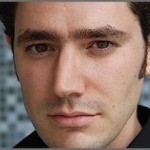Zoe Kazan and Daniel Radcliffe on the red carpet in New York City. (photo from facebook.com/thewhatifmovie/photos_stream)
When Elan Mastai’s father said hello to a pretty stranger in a Jerusalem café some four decades ago, it was the only English word he knew.
She was born in Chicago and grew up in Vancouver, and had lived in London the previous few years before trekking to Israel to explore her Jewish heritage and teach English, of all things.
It worked out pretty well for both of them. They relocated to Vancouver, got married and started a family. Now, their 39-year-old son has channeled their youthful bravado into his screenplay for What If, a warm and refreshingly grounded romantic comedy that opens in as-of-yet-unspecifed Canadian cities Aug. 22 with its original title, The F Word (F as in friend).
“The idea of moving to a country where I didn’t speak the language, different legal system, different everything, and having to start my life from scratch, it’s almost impossible for me to imagine doing that,” Mastai said in an interview. “But that’s what my father did. And he did it for love. That is a big part of the kind of things I like to write. I think in my DNA are the things that people do for love. And that’s all over this movie.”
The film imagines just-dumped Daniel Radcliffe meeting Zoe Kazan at a party, only to learn that she’s in a serious, long-term relationship. Say, there’s no reason they can’t be friends, right? It just requires a little honesty on his part and a lot of clarity on her part.
If only things were that simple, well, there’d be no movie. The film has great fun poking and prodding the central characters until one of them takes a leap of faith – and a transatlantic flight – that results in nothing I can reveal here.

“I love the romantic comedy, but it can sometimes be a bit of a debased genre because it’s a very phony genre at times,” Mastai said on the phone from Toronto, where he lives with his wife and children. “The ones I love – and they’re the ones that most people love – have something real and relatable to say about human interaction.”
Mastai’s childhood was happily marked by a Shabbat dinner every Friday night, where his large family would convene and debate the issues of the day. Everyone had strong ideas of right and wrong, but there was plenty of grey to debate, as well.
“In my personal heritage, I had all the different versions of the Jewish experience in the 20th and 21st century,” Mastai explained. “Whether it’s American Jews, European Jewry, Sephardic, the beginning of Israel, it was all literally sitting around my dinner table when I was growing up.”
Notably, the travails his grandparents had survived did not mitigate their sense of humor. “To me, the sensibility at the core of the film is very Jewish in terms of that legacy of Jewish humor, whether it’s Billy Wilder or Woody Allen or Nora Ephron or Charlie Kaufman or William Goldman,” Mastai said. “Wit and humor as a tool to defuse awkwardness and tension, and that prizing of intelligence, and the prizing of ethical behavior – these are things that were part of my Jewish upbringing, and I tried to bring those to the characters.”
We may think that a successful screenwriter, more than anything, must have a fabulous imagination. Mastai’s triumphantly demonstrates in What If/The F Word that heart and intelligence are sufficient to engage an audience in the romantic travails of a couple of ordinary people.
“All the way through it, I wanted to write what I thought of as an ethical romantic comedy,”
Mastai confided. “A comedy where people aren’t making these crazy, cockamamie schemes or twisting the truth or hiding things from each other. Everybody’s trying to do the right thing. That feels very Jewish to me because of how I was raised, that you can try to do the right thing, try to make ethical decisions, and still make a total mess of your life. Because that’s the way life is.”
Michael Fox is a San Francisco film critic and journalist.

